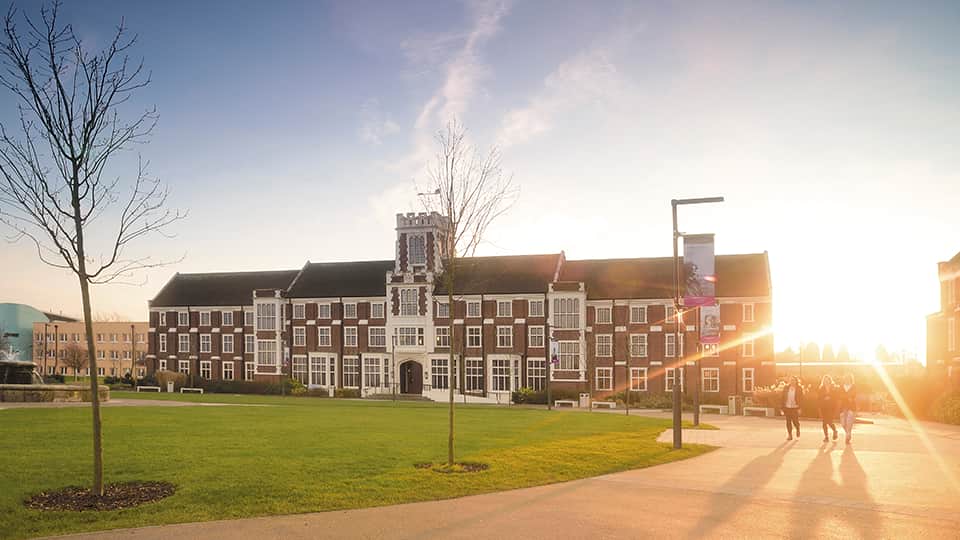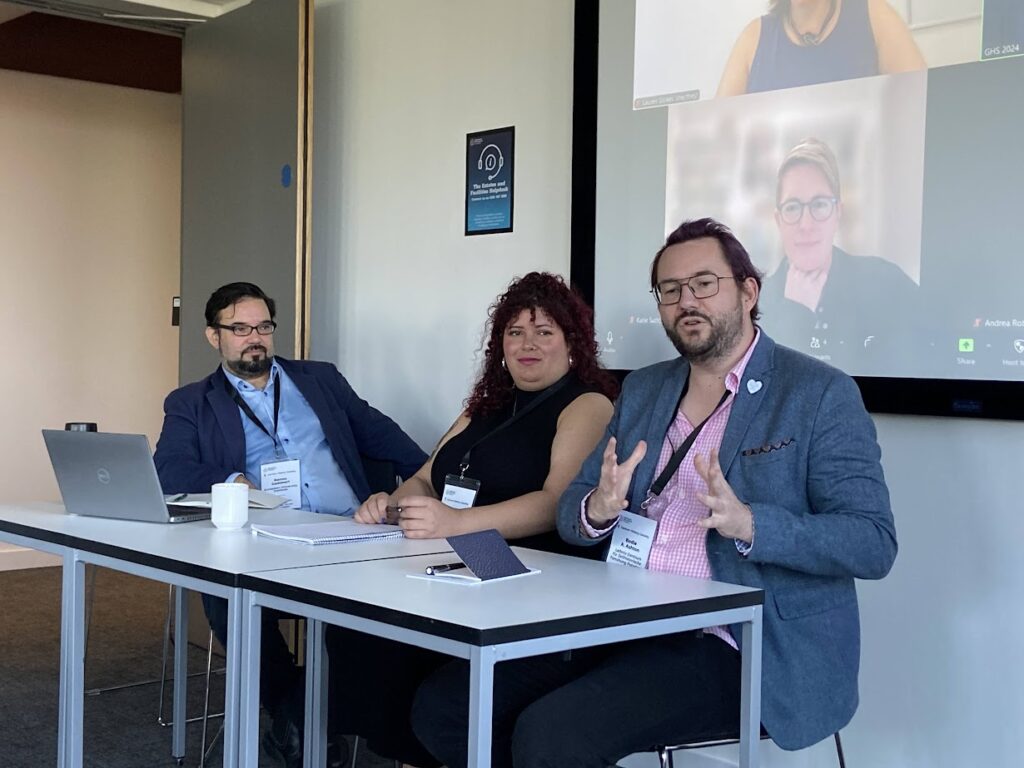2025

German History Society Annual Conference 2025
Loughborough University (Loughborough Campus)
Thursday 4 September – Saturday 6 September 2025
To register for the conference please click here
To book accommodation please click here
The German History Society annual conference, held at Loughborough University, is now open for registration. The theme for this year’s conference will be “Protest and Populism,” and confirmed keynote speakers addressing this theme include James Brophy, Lyndal Roper and Paul Nolte. Papers and round tables on all topics and periods are present..
Please note that panellists/individual presenters will have to bear the costs of the dinner, travel and accommodation themselves. Some bursaries will be available for postgraduate students; those presenting papers will receive preference for funding. Information on applying for postgraduate bursaries is available on the German History Society website: https://www.germanhistorysociety.org/postgraduate-ecr-funding/
The conference is free for members of the German History Society. There will be a modest conference fee of £25 (waged) and £8 (unwaged) for delegates who are not members of the German History Society. For details on how to join the German History Society (which also offers additional benefits, including the right to apply for our various grant schemes, and free subscription to the society’s journal, German History), see http://www.germanhistorysociety.org/membership
Programme
Thursday Afternoon Pre-Session
2–4pm GHS COMMITTEE MEETING
4–c.5.30pm GERMAN HISTORY EDITORIAL BOARD MEETING
4–c.5pm PUBLICATION / GRANT-WRITING WORKSHOP for postgraduates and ECRs
Thursday Evening Session
5–6pm Registration opens
6–7.15pm KEYNOTE LECTURE: Lyndal Roper (University of Oxford)
‘Turbulence and the German Peasants’ War of 1525’
7.15–8.15pm Wine Reception
Friday Morning Session 1: 9.00–10.45am
Panel 1 – Cultures and Sub-cultures in Germany
Chair: TBC
Leonie Bausch (University of Nottingham), ‘Sex with the (Former) Enemy: Intimacy, Entertainment, and Conflict in French-Occupied Germany after WW2’
Claire MacLeod (University of Oxford), “Beyond the ‘Heloïse Complex’: Hannah Arendt, Edith Stein, and Elisabeth Blochmann as Historical Case Studies in Academic Mentorship”
Panel 2 – National Socialism and Its Aftermath
Chair: Caroline Sharples (Roehampton)
Lewis Champion (Royal Holloway, University of London), ‘932 Lives: Uncovering the Persecution of Homosexual Men in Nazi Concentration Camps Through Archival Data’
Jenna Byers (University College London), “Hitler’s Legacy: Similarities between Hitler’s attitude to women and modern ‘incel’ terrorist depictions of ‘femoids’”
Georgia Whittacker (The University of Western Australia), ‘A New Terrain of Insecurity: Jewish Child Survivors’ Experience of Antisemitism in the Postwar German States’
Panel 3 – The First World War
Chair: Marina Pérez de Arcos (Oxford/LSE)
Mathis Gronau, ‘A No-Man’s-Land of Identity: The Experiences of German Minorities in France and Great Britain between 1914 and 1924’
Hiroaki Murakami (University of Tsukuba), ‘War Experience of Non-ordinary People: Tuberculosis Patients during the First World War’
Jonathan Slater (LSE), ‘Ersatz food regulation and the paradox of government intervention in Germany during the First World War’
10.45-11.15am Tea/Coffee Break
Friday Morning Session 2: 11.15am–12.45pm
Panel 4 – Media, History and the Eichmann Trial in East and West Germany
Chair: Tetyana Pavlush (Cardiff University)
Florine Miez (Leibniz Institute for Contemporary History, Munich), ‘Media, Trials of National Socialist Perpetrators in the West and East German Press: An Analysis of the Eichmann Trial’
Joscha Döpp (Fritz Bauer Institut, Frankfurt am Main), ‘Confronting the Past: Henry Ormond’s Public Media Interventions in Postwar Germany’
Lisa Städtler (Christian-Albrechts-Universität, Kiel), ‘Das Magazin, its authors and the question of history: A popular East German window on the past?’
Paul Moore (University of Leicester), “‘This Man Represents all of Germany’: Bild-Zeitung, Eichmann and Popular History in the Federal Republic’
Panel 5 – Monarchy and Empire
Chair: Mark Hewitson (UCL)
Michael Phillips, ‘From Opposition to Acclamation: The Transformation of the Prussian Army 1860–1875’
Parveen Kanhai, ‘From Temple to Circus Tent: Popular Orientalism in Hagenbeck’s Sri Lankan and Indian Ethnic Shows (1883–1930)’
Ivo van Donselaar (University of Münster/Radboud University Nijmegen), ‘Pan-Germanicism from outside: Hopes and Fears between Tribal Relatives, 1880–1945’
Panel 6 – Social and Political Thought
Chair: TBC
Stanisław Banach (University of Cambridge), ‘The Medieval Preacher as Populist Politician: Nicolaus Tempelfeld and the Internal Politics of Breslau, 1457–67’
Petar Ćurčić (Institute of European Studies, Belgrade), ‘Werner Sombart, Capitalism and the Conception of the Social Movement: From the Social Reformist Critique of the Wilhelminism to Elitist Anti-capitalism (1888–1907)’
Aileen Lichtenstein (Warwick), ‘German Anarchist Newspapers as a Form of Counter-Hegemonic Internationalism’
Lunch 12.45–2 pm
Friday Afternoon Session: 1: 2–3.30pm
Panel 7 – Gender in the GDR and FRG
Chair: Chris Dillon (KCL)
Hannah Cogan (King’s College London), ‘The Denazification of Women in the British Occupation Zone of Postwar Germany, 1945–1955’
Anna McEwan (Leibniz Centre for Contemporary History, Potsdam), ‘Ambivalent Agents: When Can Women Choose? Abortion, Activism, and the Democratic Women’s League of Germany’s Shifting Ideologies (1960–1995)’
Anja Segmueller (Cambridge), ‘Bodies That Protest: Feminist Art and Performative Dissent in Late Socialist East Germany’
Panel 8 – The State, the Law and the People in the Nineteenth Century
Chair: Anna Ross (University of Sheffield)
Charlotte Johann (QMUL), ‘The German Legal Imagination between Imperial Constitutionalism and International Law, 1806–1900’
Jean-Michel Johnston (Cambridge), ‘Between Self-Determination and Democracy: “The People” and Statehood in German-Speaking Central Europe, 1850–1870.
Bethany McNamara-Dale (Oxford), ‘Democracy and Constitutionalism in the German Confederation: Kurhessen’s Crises and the Hassenpflug Era(s) (1831–62)’
Panel 9 – Secret Services in Twentieth-Century German History
Chair: Thoralf Klein (Loughborough University)
Patrick Major (University of Reading), ‘Allied Intelligence on the German Home Front in World War Two’
Paul Maddrell (Loughborough University), ‘The Stasi in the History of the Cold War’
Mark Fennemore (Manchester Metropolitan University), ‘Listening to What the “silent war” had to Say: (Re)defining Subversive Warfare in Cold War Berlin’
Panel 10 – GHS Outreach and Impact Grant Panel: Elite-School Pupils and War Games in Nazi Germany
Helen Roche (Durham University), ‘Exploring Forgotten Voices of Former Nazi Elite-School Pupils’ (Film Screening)
Ben Shepherd (Glasgow Caledonian University), “Mercy Squad: An Education Experience on Perpetrators and Protectors in the Nazi ‘War of Annihilation’ against the Soviet Union”
3.30-4pm Tea/Coffee Break
Friday Afternoon Session 2: 4–5.30pm
Panel 11 – Power and Economics in the GDR
Chair: TBC
Chris Law (Newcastle University/Berlin Wall Foundation), ‘Guarded Memory: The GDR Border Regime and Enrolment in Post-Reunification Erinnerungskulturen’
Kayla Berg (King’s College London), ‘Lingering Influences from the Cold War: Stasi Psychology in Foreign Intelligence Gathering, 1961–1990’
Peter Nunes (McGill University), “‘We are Making Debts with the Capitalists to the Limit of the Possible’: Technical Modernization and the Origins of the East German Debt Crisis, 1968–1982”
Panel 12 – Nazi Carceral Space
Chair: Paul Moore (University of Leicester)
Cretney, ‘A Prison within a Concentration Camp? Interpreting Nazi Carceral Atmospheres’
Hotz, ‘SA-Camp Hochkreuz: A Case Study of Early Violence’
Hansen, ‘From State Archive to a Temporal Nazi Carceral Space: The Case of the Gestapo Headquarters in Kristiansand, Norway’
Panel 13 – Democracy in German Lands, 1780–1870
Chair: Mark Philp (Warwick/Oxford)
Anne Heyer (Leiden University), ‘Hanseatic tradition of Demokratie? The meaning of democracy in the cities of Bremen, Hamburg and Lübeck’
Theo Jung (Martin-Luther-University Halle-Wittenberg), ‘Prussian Democracy? Territorial Variations in a Complex State (1815–1870)’
Franz Fillafer (Austrian Academy of Sciences, Vienna), ‘Habsburg Encounters with Democracy: Popular Participation in the Multilingual and Multireligious Habsburg Polity (1800–1860s)’
6–7.15pm KEYNOTE LECTURE: Paul Nolte (FU Berlin)
Spectres of the Nazi Past? Or: How Much German History Lingers in Germany’s New Right-Wing Populism
7.30–10pm Conference Dinner (location tba)
Saturday Morning Session 1: 9–10.30am
Panel 14 – Material Culture in Early Modern Bavaria
Chair: Roisin Watson (Open University)
Stuart Moss (UCL), ‘Material Memories: A Rococo Abbot’s Crozier and the Bavarian Secularisation of 1803’
Frederick Crofts (Jena), ‘Wasserkunst: Art-Lovers, Hydraulic Projects, and Artisanal Knowledge at Wittelsbach Courts, c. 1600’
Sophia Feist (Cambridge), ‘Tailoring Politics: Collaboration between artisan workshops at the courts of Wilhelm IV and Ludwig X’
Panel 15 – Teaching the GDR Today – Roundtable
Chair: Ned Richardson-Little (Centre for Contemporary History Potsdam [ZZF])
Anna Saunders (University of Liverpool)
Sebastian Gehrig (University of Sheffield)
Eli Rubin (Western Michigan University)
Emily Steinhauer (Royal Holloway, University of London)
Panel 16 – Rethinking German Politics
Chair: Mark Hewitson (UCL)
Claudia Kreklau (St Andrews), ‘Rethinking the German Empire: Echoes, Rhymes and Paradoxes’
Matthew Stibbe (Sheffield Hallam University), ‘A Shoaling, not a Schooling: The SPD and Enabling Acts in pre-1933 Germany’
Quinlan, ‘The Populist Tactics of the Referendum: The Annexation of Austria in 1938’
Panel 17 – Mercy Squad
Lead: Ben Shepherd (Glasgow Caledonian University)
An interactive game about Nazi Germany and the Second World War
10.30-11am Tea/Coffee Break
11.15-12.30 KEYNOTE LECTURE: James Brophy (University of Delaware)
‘Populism avant la lettre? Popular Protest in Nineteenth-Century Germany’
12.30-1.30pm Lunch
1.30-2.30pm Annual General Meeting of the German History Society
Many thanks to the Conference Team in Loughborough, especially Dr Paul Maddrell.

